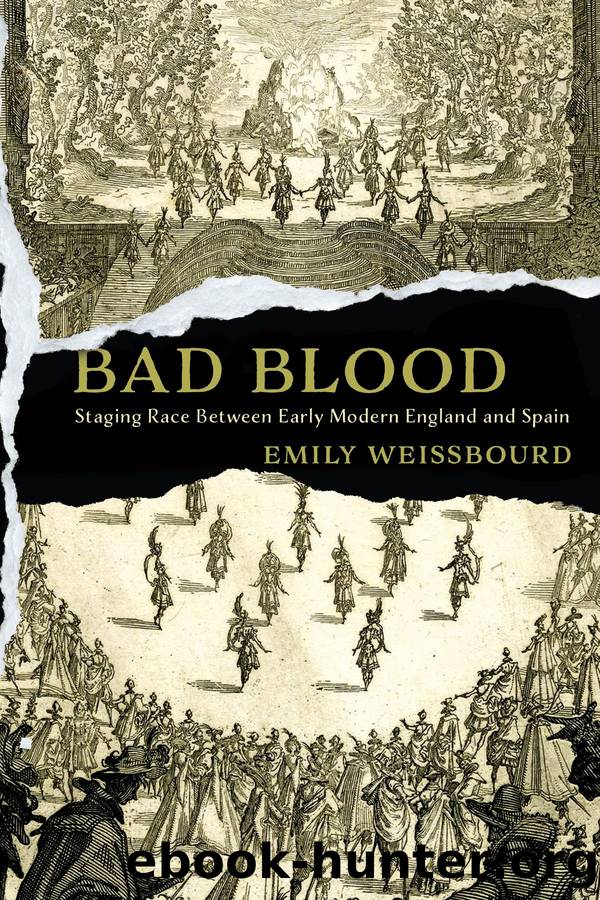Bad Blood by Emily Weissbourd;

Author:Emily Weissbourd;
Language: eng
Format: epub
ISBN: 978-1-5128-2289-2
Publisher: Lightning Source Inc. (Tier 2)
Published: 2022-12-16T00:00:00+00:00
I am a Moore borne in Numedia,
Parcht with the suns extreame and scorching heate;
My mothers name Abdela Sydan hight,
My Father was Don Ian de Ʋechia,
A noble Spaniard, braue Castilian:
I serude the King of swart Numidia . . .
Son of a Moorish woman and a Spanish lord, Adnidaraes Quixot informs the audience that he was a general in Numidia before coming to Europe to seek his father and his fortune. He is given lines in a nonsense language that is meant to imitate Arabic, and laments that fortune has caused him to lose his âstore of Barbarie gold,â and that he has gone from being in command of âmany menâ to serving his âMasterâs man.â In his final line he promises that, if granted more gold, he will ârun from hence to Spaine.â Quixot is an exotic comic figure whose primary purpose seems to be to embody the Black Legend stereotype of Spanish-Moorish intermingling. He describes himself as both Black and Muslim, but the term he uses to describe his religion is not âMoorâ but âTurk.â He is a âSpaniard, Moore, half Turke, half Christian.â âMooreâ here is paired with âSpaniardâ as a description of national and cultural origin, while the word âTurkeâ is used alongside âChristianâ to describe religion.
Ultimately, I found only three plays that straightforwardly stage a characterâs Blackness as a sign of specifically Islamic difference. In Allâs Lost by Lust (1619), which recounts the fall of Spain to the Moors, Moors as a group are described as âbarbarous and tawny,â âswarty,â âsooty,â and âhalf-naked infidels.â Although the play does not contain many references to Islam, when the evil âMully Moomen, king of Africaâ offers to marry the white noblewoman Jacinta, she refuses on the grounds that it would be a âsecond hellâ for âa Christianâs arms [to] embrace an infidel.â32 Allâs Lost by Lust represents the king as doubly threatening to the white, Christian Jacinta in that he is both Black and Muslim. The play exemplifies a dynamic often attributed to Othello in which Blackness can be read as both phenotype and metaphorical representation of Islamic difference. A version of this dynamic also appears in both parts of The Fair Maid of the West, in which the King of Fez is portrayed as both Black and Muslim and as a sexual threat to the beautiful white Bess, âthe girl worth gold.â33 These plays do reflect a dynamic in which Blackness appears as an external sign of threatening Islamic difference. This is the dynamic that critics such as Lupton, Neill, and Vitkus evoke when arguing that Othello is tied more closely to religious difference than to anti-Blackness. However, these plays (which include, it is worth noting, a play and its sequel rather than three stand-alone works) are the exception rather than the rule.
There is one final play with both Moorish characters and a tenuous connection to Islam: John Fletcherâs The Island Princess (1619â21). The play is set in the Moluccan Islands and presents a complex series of political maneuvers
Download
This site does not store any files on its server. We only index and link to content provided by other sites. Please contact the content providers to delete copyright contents if any and email us, we'll remove relevant links or contents immediately.
| Acting & Auditioning | Broadway & Musicals |
| Circus | Direction & Production |
| History & Criticism | Miming |
| Playwriting | Puppets & Puppetry |
| Stage Lighting | Stagecraft |
Call Me by Your Name by André Aciman(18989)
Ready Player One by Cline Ernest(12863)
How to Be a Bawse: A Guide to Conquering Life by Lilly Singh(6701)
Wiseguy by Nicholas Pileggi(4601)
The Kite Runner by Khaled Hosseini(4472)
On Writing A Memoir of the Craft by Stephen King(4221)
The Crown by Robert Lacey(4115)
Audition by Ryu Murakami(4107)
Call me by your name by Andre Aciman(4080)
Harry Potter and the Cursed Child: The Journey by Harry Potter Theatrical Productions(3983)
Gerald's Game by Stephen King(3927)
The Perils of Being Moderately Famous by Soha Ali Khan(3789)
Dialogue by Robert McKee(3593)
Dynamic Alignment Through Imagery by Eric Franklin(3499)
Apollo 8 by Jeffrey Kluger(3205)
How to be Champion: My Autobiography by Sarah Millican(3193)
Seriously... I'm Kidding by Ellen DeGeneres(3106)
Darker by E L James(3093)
History of Dance, 2E by Gayle Kassing(3001)
